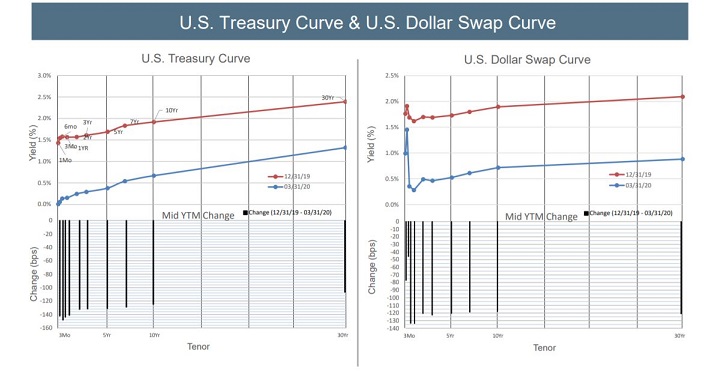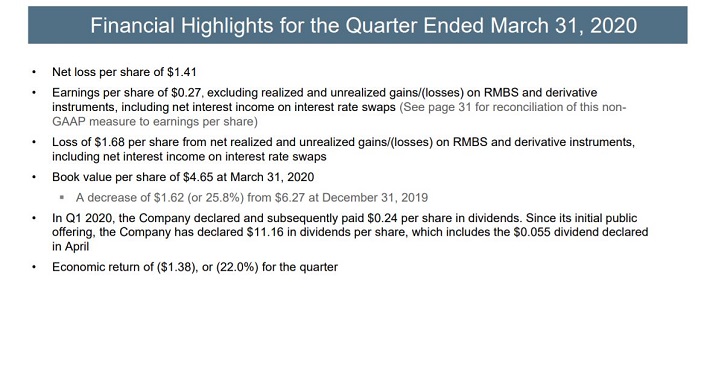Updated on May 26th, 2020 by Nate Parsh
Investors are likely familiar with the standard Real Estate Investment Trusts, or REITs. Most REITs own physical real estate, lease the properties to tenants, and derive rental income which is used to pay dividends.
But there is a different set of REITs that investors may not be as familiar with: mortgage REITs. These REITs do not own physical properties, but rather buy mortgage securities.
Mortgage REITs typically have much higher dividend yields than standard REITs, but this does not necessarily make them better investments.
For example, Orchid Island Capital (ORC) is a mortgage REIT, with an extremely high dividend yield of almost 16%. And this is after the trust recently cut its dividend by nearly a third.
Orchid Island pays dividends each month, which makes it even more attractive as a dividend stock. It is one of less than 60 monthly dividend stocks. You can access the full database of monthly dividend here.
You can download our full Excel spreadsheet of all monthly dividend stocks (along with metrics that matter like dividend yield and payout ratio) by clicking on the link below:
It is one of nearly 400 stocks with a 5%+ dividend yield, and is one of the highest-yielding stocks on the list. You can see the full list of established 5%+ yielding stocks here.
However, the outlook for mortgage REITs is challenged, and Orchid Island’s dividend yield may still not be sustainable even after the recent dividend cut.
This article will discuss why income investors should not be lured by Orchid Island’s extremely high dividend yield.
Business Overview
Whereas traditional REITs own a portfolio of properties, mortgage REITs are purely financial entities. Orchid Island is an externally-managed, specialty finance company. Orchid Island invests in residential mortgage-backed securities, either pass-through or structured agency RMBSs.
An RMBS is a debt instrument that collects cash flows, based on residential loans such as mortgages, home-equity loans, and subprime mortgages. Mortgage-backed securities are an investment product representing a basket of pooled loans.
As investors saw first-hand during the 2008 financial crisis, mortgage-backed securities can be highly volatile and risky. This is the first reason why risk-averse income investors would be wise to steer clear of Orchid Island.
Mortgage REITs were among the biggest winners as interest rates were falling during the aftermath of the Great Recession.
Source: Investor Presentation, page 7
With rates near zero today, investors might be tempted to view Orchid Island as a potential investment due to lack of risk from rising interest rates. We would advise against that, however. The stock has declined by 36% of the last year. This more than wiped out any gain from the high yield.
Growth Prospects
Mortgage REITs make money by borrowing at short-term rates, lending at long-term rates, and pocketing the difference, or the spread between the two.
When the spread between short-term rates and long-term rates compresses, profitability erodes. This is why mortgage REITs can be dangerous if short-term interest rates are about to increase.
However, the Federal Reserve isn’t expected to increase interest rates for some time, especially as the COVID-19 pandemic weighs on the economy.
Despite this, Orchid’s Island’s most recent quarter showed that growth may not return for some time.
Source: Investor Presentation, page 4
The trust had a net loss of $91.2 million, or $1.41 per share, compared to net income of $10.6 million, or $0.22 per share, in the first quarter of 2019. Net income added $0.30 per share to results, but this was more than wiped out by $1.68 per share of RMBS and derivative losses, and $0.03 per share of expenses.
Total return, which includes $0.24 of dividends per share and a $1.62 decrease in book value per share dividend by beginning book value per share, was a negative 22%.
Orchid Island’s inability to perform well with interest rates at zero makes it unlikely that the trust can regain its footing if and when interest rates eventually rise again.
Dividend Analysis
Orchid Island’s eroding fundamentals have caused a significant drop in its dividend payments to shareholders in the past several years.
Orchid Island currently pays a monthly dividend of $0.0.55 per share, which is more than a 31% decrease from March 2020. This comes after the trust cut its dividend twice in 2018.
On an annualized basis, the trust has a current dividend payout ratio of $0.66 per share. Based on its May 22nd closing share price of $4.17 per share, the stock offers a 15.8% dividend yield. This is a huge dividend yield, considering the S&P 500 Index, on average, has a ~2% dividend yield.
However, there are too many red flags for Orchid Island to be considered an attractive investment, including the trust’s multiple dividend cuts over the past few years.
In addition, Orchid Island has issued shares at a high pace in recent years. While the trust reduced its shares outstanding 7.4% in 2018, Orchid Island’s share count has increased nearly 18x since 2013. This comes at a steep cost to shareholders, in the form of heavy dilution.
Plus, the trust’s annual earnings-per-share do not cover its hefty dividend payment. All of this seems to suggest a dividend cut could occur again, with perhaps a significant reduction in a recession.
Orchid Island also does not have a long history of consistent dividend growth. It has paid dividends only since 2012. Except for 2017 when the trust paused its dividend growth, it has reduced its dividend every year since 2013.
With a volatile dividend history, Orchid Island is not an appealing choice for investors looking for steady dividend payouts from year to year.
Final Thoughts
Sky-high dividend yields can be deceiving. Orchid Island’s nearly 16% dividend yield is enticing, but this stock has all the makings of a yield trap.
The trust is not covering its dividend with earnings. It also has a sizable amount of debt on the balance sheet, and is issuing shares at an alarming pace.
The outlook for mortgage REITs has improved slightly due to low interest rates. Overall, this should benefit the sector, but this doesn’t appear to be the case with Orchid Island. The trust’s most recent quarter showed extreme weakness, which isn’t likely to dissipate in a struggling economy.
Orchid Island has cut its dividend several times in the past few years due to these pressures, and another dividend cut may be in the cards. Investors should tread very carefully with mortgage REITs like Orchid Island. As a result, income investors would be better served buying higher-quality dividend stocks, with more sustainable payouts.







